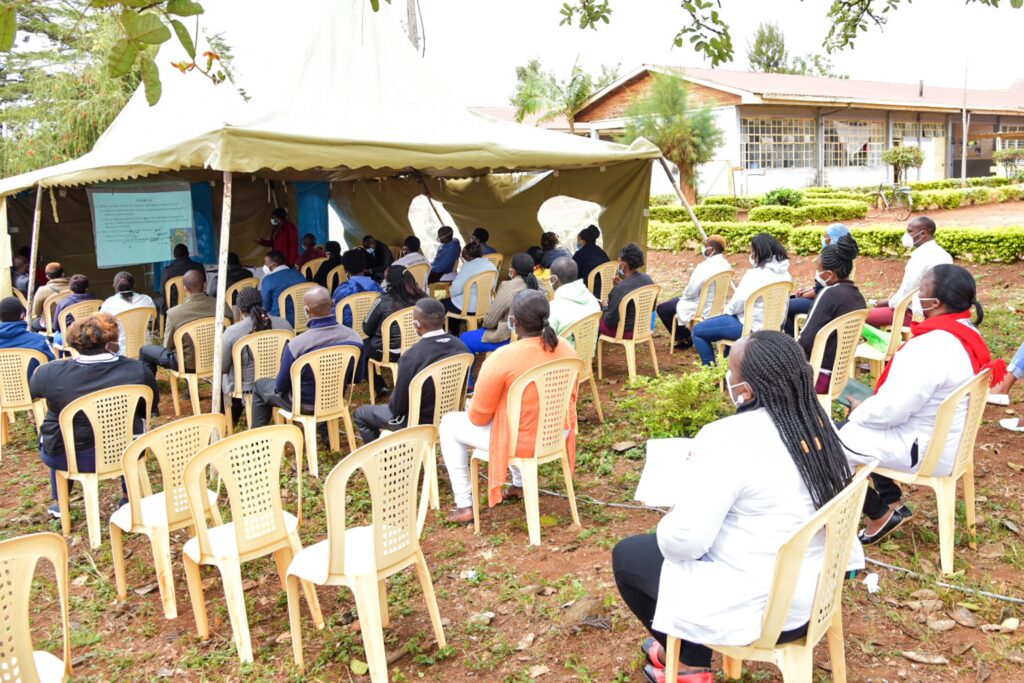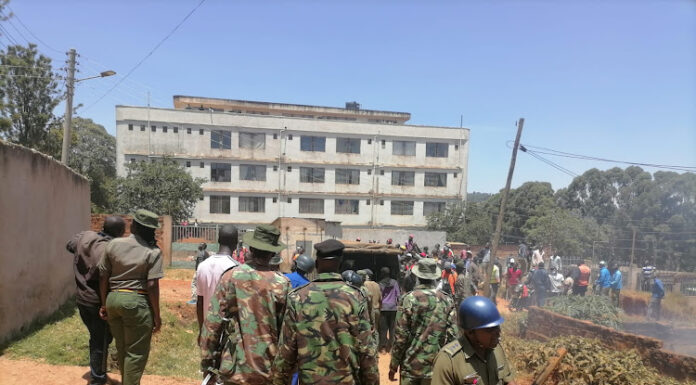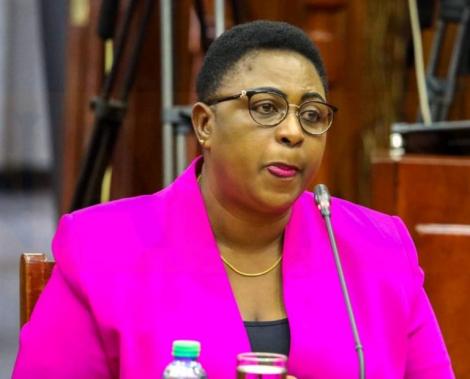
Photo by Irungu Mwangi.
About 170 health workers from Kirinyaga County have over the last one week been trained on Infection Prevention and Control (IPC) as a way of combating coronavirus.
The training that targeted technical and nontechnical staff from selected health facilities was conducted by IPC experts from Kenyatta National Hospital (KNH).
Governor Anne Waiguru speaking in Kerugoya, said the training that came after a request by the county government to KNH was aimed at building the capacity of the health workers to protect themselves as well as patients from getting infections while at the health facilities.
She said that hospitals, being the place where many sick people flock are also where infections congregate and therefore there is great need to put measures of preventing infections from passing from one person to another.
Waiguru said that even though IPC protocols should be upheld at all times, health workers should be extra-vigilant in the wake of Covid-19 pandemic to protect themselves as well as patients seeking services from them.
She noted that although the IPC training was triggered by the threat of Covid-19, the County Government recognizes the great need to build the capacity of health workers to enhance service delivery at all the public health institutions.
The weeklong training involved 92 technical health workers and 80 non-technical staff drawn from Kerugoya Referral Hospital and Kianyaga, Sagana, Kimbimbi, Thiba, and Baricho Health Centers.
Some of the technical staff trained included Medical Officers, Clinical Officers, Laboratory Technologists, while the non-technical participants were drawn from support staff and casual workers.
Kenyatta National Hospital Chief Executive Officer, Dr. Evanson Kamuri, whose team also carried out an audit on Kerugoya County and Referral Hospital’s preparedness on Covid-19, said that Infection Prevention and Control was one of the most effective ways of combating coronavirus and therefore it was important to have a well prepared and trained workforce.
Kirinyaga County Chief Officer, Dr. Muriithi Nyaga, said that the health workers were trained on some of the infection control principles and practices for local health agencies, including standard precautions, hand hygiene, personal protective equipment, cleaning and disinfection, respiratory hygiene and waste disposal among others.
He noted that infections can be passed from patients to patients, health workers to patients or vice versa and also among health workers themselves.
“IPC practices help in prevention and reduction of disease transmission and eliminate sources of potential infections.
It also protects patients against acquiring nosocomial infections that occur as a result of a patient coming into contact with a pathogen that was not present at the time the person infected was admitted at a hospital,” said Dr. Nyaga.
He said the cooperation with KNH is the beginning of more engagement with the national hospital to ensure improved standards of care and patient management outcomes for the people of Kirinyaga in other areas apart from Covid-19 management.
About 170 health workers from Kirinyaga County have over the last one week been trained on Infection Prevention and Control (IPC) as a way of combating coronavirus.
The training that targeted technical and nontechnical staff from selected health facilities was conducted by IPC experts from Kenyatta National Hospital (KNH).
Governor Anne Waiguru speaking in Kerugoya Saturday, said the training that came after a request by the county government to KNH was aimed at building the capacity of the health workers to protect themselves as well as patients from getting infections while at the health facilities.
She said that hospitals, being the place where many sick people flock are also where infections congregate and therefore there is great need to put measures of preventing infections from passing from one person to another.
Waiguru said that even though IPC protocols should be upheld at all times, health workers should be extra-vigilant in the wake of Covid-19 pandemic to protect themselves as well as patients seeking services from them.
She noted that although the IPC training was triggered by the threat of Covid-19, the County Government recognizes the great need to build the capacity of health workers to enhance service delivery at all the public health institutions.
The weeklong training involved 92 technical health workers and 80 non-technical staff drawn from Kerugoya Referral Hospital and Kianyaga, Sagana, Kimbimbi, Thiba, and Baricho Health Centers.
Some of the technical staff trained included Medical Officers, Clinical Officers, Laboratory Technologists, while the non-technical participants were drawn from support staff and casual workers.
Kenyatta National Hospital Chief Executive Officer, Dr. Evanson Kamuri, whose team also carried out an audit on Kerugoya County and Referral Hospital’s preparedness on Covid-19, said that Infection Prevention and Control was one of the most effective ways of combating coronavirus and therefore it was important to have a well prepared and trained workforce.
Kirinyaga County Chief Officer, Dr. Muriithi Nyaga, said that the health workers were trained on some of the infection control principles and practices for local health agencies, including standard precautions, hand hygiene, personal protective equipment, cleaning and disinfection, respiratory hygiene and waste disposal among others.
He noted that infections can be passed from patients to patients, health workers to patients or vice versa and also among health workers themselves.
“IPC practices help in prevention and reduction of disease transmission and eliminate sources of potential infections.
It also protects patients against acquiring nosocomial infections that occur as a result of a patient coming into contact with a pathogen that was not present at the time the person infected was admitted at a hospital,” said Dr. Nyaga.
He said the cooperation with KNH is the beginning of more engagement with the national hospital to ensure improved standards of care and patient management outcomes for the people of Kirinyaga in other areas apart from Covid-19 management.
Dr. Nyaga added that the county government has continued to enforce Covid-19 prevention guidelines and urged all county residents to play their role in protecting themselves against the virus.
Dr. Nyaga added that the county government has continued to enforce Covid-19 prevention guidelines and urged all county residents to play their role in protecting themselves against the virus.










